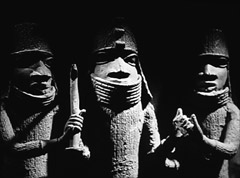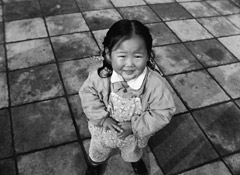Chris Marker was born in 1921, in Neuilly-sur-Seine in the suburbs of Paris. His government name is Christian François Bouche-Villeneuve. It is said that Chris Marker participated in the resistance during the Second World War, and after the war’s closure became active as a critic, translator, editor, and writer. In 1952 he released his first film, Olympia 52. From then on Marker began to travel the world as a photographer, and became known as a documentarian with his production of Sunday in Peking and Letter from Siberia. In 1962 he released the short, science fiction film La jetée, establishing himself as a filmmaker not bound to the frame of documentary.
Marker’s anti-authoritarian politics came to be strongly represented in his work during the late 1960s and 1970s. In 1967 he founded the film collective SLON, and beginning with Far from Vietnam started to make films embodying the political struggles occurring across the globe. That same year, he founded the Group Medvedkin together with the workers of a factory in Besançon. The group supported workers as they took cameras into their own hands to make their own films—its name is a tribute to the Soviet director Alexander Medvedkin. In 1977 Chris Marker released Grin Without a Cat, his opus constructed of images of political movements from 1960 to 1970.
 After 1980, Marker began to focus on problems of media and memory. During this period he released Sans soleil (1982), which intertweaves history and personal memory. These themes are also addressed in The Last Bolshevik (1993) and Level Five (1996). Marker’s interests expanded into multimedia, and in the 1990s he produced installations and CD-ROMs. In 2007 he created the virtual space Ouvroir in the online video game Second Life. He continued to release photographs and visual works until July 2012, when he passed away in his apartment in Paris at 91 years of age.
After 1980, Marker began to focus on problems of media and memory. During this period he released Sans soleil (1982), which intertweaves history and personal memory. These themes are also addressed in The Last Bolshevik (1993) and Level Five (1996). Marker’s interests expanded into multimedia, and in the 1990s he produced installations and CD-ROMs. In 2007 he created the virtual space Ouvroir in the online video game Second Life. He continued to release photographs and visual works until July 2012, when he passed away in his apartment in Paris at 91 years of age.
Statues Also Die
Les statues meurent aussi FRANCE / 1953 / French / B&W / 35mm / 32 min
FRANCE / 1953 / French / B&W / 35mm / 32 min
Directors: Alain Resnais, Chris Marker
Photography: Ghislain Cloquet
Sound: René Louge
Music: Guy Bernard
Narration: Jean Négroni
Production Company: Tadié-Cinéma-Production
Source: Institut français
A short film by Marker and Alain Resnais, which asks why black works of art are displayed in the Museum of Anthropology, whereas Greek and Egyptian art are shown in the Louvre. This film, which criticizes colonialism, was censored by the French government and banned from screening for close to a decade.
Sunday in Peking
Dimanche à Pékin FRANCE / 1956 / French / Color / 35mm (Original: 16mm) / 18 min
FRANCE / 1956 / French / Color / 35mm (Original: 16mm) / 18 min
Director, Photography: Chris Marker
Editing: Francine Grubert
Music: Pierre Barbaud (Composer), Georges Delerue (Orchestra)
Narration: Gilles Queant
Advisor: Agnès Varda
Producer: Madeleine Casanova-Rodriguez
Production Companies: Argos Films, Pavox Films
Source: Tamasa Distribution
In 1955, Marker accompanied Michel Leiris and Paul Ricœur on a friendship mission to China. Recorded at that time, this film is a vibrant depiction of Peking following the revolution, its cityscape, and its people full of hope. The opening scene connects the Eiffel Tower with various memories from the trip, in an early expression of the issues of memory that would later become the theme for Marker’s life work.
